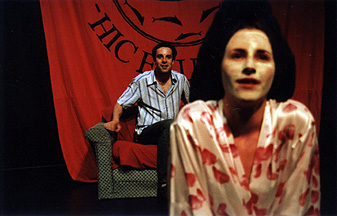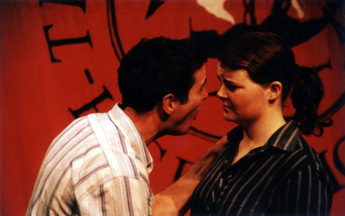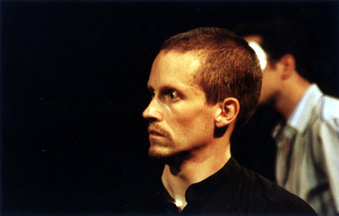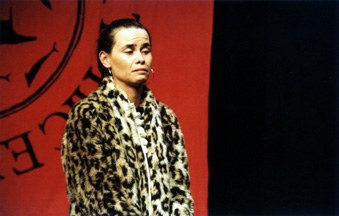
romeo and juliet
by william shakespeare
Blame the drugs. Blame the friar who gives them to Juliet so she can
pretend to be dead, to avoid an arranged marriage and elope with Romeo.
Blame the parents on both sides for their feud which forces the young
lovers apart. Blame their friends whose fatal brawl sees Romeo banished
from the state. Blame the hormones; cupid; the letter that never gets
through. Blame all the above since in this production of Shakespeare's
"most excellent and lamentable tragedie", you see only too clearly how
the elements pile up on the road to catastrophe.
We know these kids are doomed; they've been committing suicide, under
a gross misapprehension, for centuries. So, to tell their story with
a new urgency and pathos, as the Bacchanals do here, is no mean feat.
This young company takes a radical, purist approach to presentation.
Eschewing elaborate sets, costumes and special effects, they opt for a
bare stage with the minimum of props. More significantly, they forgo a
coy editing of the text and gleefully present an uncut original version,
complete with all its elaborations, divergent humor and musical
interludes. When so much comedy - sex jokes, puns and innuendo - is
restored to the tragedy, and played with such buoyancy, the cruel
ironies of the story are amplified. The result is the most engaging
Shakespeare I've seen. For one thing, the verbiage is delivered at a
cracking pace. Some might say too fast, and such speed could have been
disastrous in the wrong hands - or mouths.
But while the bard's clever, campy metaphors are flying thick and fast,
such quickness makes them work like symbols, instantly absorbed, not
requiring us to think, just feel.
Which we find ourselves doing at the famously unlucky climax, staged
freshly and powerfully on a fold out sofa bed under red light. The
effect of the Bacchanals' approach is to re-create a theatrical feel
that is excitingly close to what one imagines the robust, emotionally
and linguistically promiscuous Elizabethan dramatic spirit to have
felt like. More good news is that what really works in theatre also
makes this show portable. Those large and small towns through which
this show is set to sizzle - Upper Hutt, Gisborne, Raetihi et al - are
lucky indeed.
- Mary Anne Bourke,
Sunday Star Times
"Wellington's most fearless theatre company take on Shakespeare's most
clichéd play. A classic tale of boy meets girl, boy stalks girl and
turns up under her balcony in the middle of the night, boy kills girl's
cousin, girl drinks sleeping potion, messenger gets waylaid, boy drinks
poison, girl disembowels herself, friar and nurse escape unpunished and
feuding families erect statues of their dead kids. There's also two hours
of traffic and a famous speech about a fairy." - www.thebacchanals.net
post-Baz Luhrman, it seems that everyone is falling over them self to
re-invent and re-image Shakespeare. Directors toy with period settings,
gender, sexuality and accent, among other things, in an effort to be the
Most Original Production, and it pisses me off. Not because I'm a purist,
mind you, but because it's beginning to seem really tired. The Bacchanals'
February run of Romeo and Juliet did all those things, and I couldn't
have loved it more. Why did it work in this instance? Well, inasmuch as
anyone should be a purist about Shakespeare, his text is, of course, the
key. The Bacchanals' manifesto states a commitment to great, text-based
plays, and, true to their word, the entire script of the "two hours'
traffic" (said with knowing, iffy hand gestures in the opening chorus)
was performed.
A company of just nine actors, playing several roles each, with nary a
weak link to be found also helped. The performances were superb: the
dialogue delivered often at breakneck speed: no grandstanding or
 showponying allowed among these young thesps, obviously. Standout were
Hadleigh Walker as Mercutio (boy, could he die) and Erin Banks' Benvolio
- a laddish, expressive performance.
showponying allowed among these young thesps, obviously. Standout were
Hadleigh Walker as Mercutio (boy, could he die) and Erin Banks' Benvolio
- a laddish, expressive performance.
Casting was clearly without agenda, and it was refreshing to see women
taking on male parts with no politicisation. And modernisation of
setting worked here again, because the text was the key. Where Luhrman
used "Longsword" branded rifles in a fairly contrived way to make his
setting work, the Bacchanals instead work with the script: "the mask
of night" becomes a face mask, for example. Romeo pops Smints™
before the wedding. The lovers emerge with sex hair the morning after.
I got the feeling, watching this production, that I'd wandered into a
really, really good rehearsal. All the fun with none of the performance
anxiety, the actors in their street clothes, sitting on beer crates
onstage, relaxing with beer off.
- Sarah Barnett,
Salient
Star-Cross'd In A Post-Baz World
The set for the Bacchanals' new production of
Romeo & Juliet is simple, the sort
of thing you'd expect from a play about to tour the provinces on the smell
of an oily rag. A few beer crates, an old couch and the increasingly
prominent Bacchanals backdrop displaying their faux-Greek logo and Latin
motto: 'Hic et Ubique': 'Here and Everywhere'.
In the director's notes, David Lawrence states "so much of the public
perception of the play has been set in stone by Baz Luhrmann's film of
1996 - every year without fail at the annual Sheila Winn Shakespeare
festival there's a Romeo & Juliet
piece with guns and Hawaiin shirts". The challenge for the Bacchanals
here is making something familiar fresh. The film is so deeply ingrained
in the general consciousness that seeing the thing with new eyes is
difficult. Luhrmann cut huge segments of the script in order to present a
snappy, erotic, colourful and loud production which wasn't too hard on
the grey matter: love in the time of Colt .45s. The Bacchanals' set, and
production, is like a two-finger salute fired squarely at Baz and Leo.
The film had huge, custom-made sets and special effects; this company
barely makes use of their stage-lights.
The Bacchanals are a smart and resourceful company made up of actors
doing the work for love over money; and they aren't afflicted with the
curse of vanity so evident in many similar co-ops. Their productions
are thorough and selfless - it's hard to wallow in thespian
narcissism when you have a truckload of text to get through.
At the start of the show, the cast's energy is almost over-whelming. The
early conflict between the fueding Montagues and Capulets is played with
frantic control (to coin a phrase Romeo might have), and only slows when
Prince, played in detective drag by Tina Helm, breaks it up.
It's nice to see the lovers in the play presented not as noble
revolutionaries of the heart, but as vapid young people who just don't
think things through. Alex Greig's Romeo is impestuous, horny and a big
wuss, while you can imagine Juliet, played by Julia Harrion, reading
Cleo and Smash Hits while deciding who she's going to have a crush on
next. After all, she is only
thirteen.
The couple are doomed from the start.Romeo seems more at home rapping
with Benvolio (a very impressive performance from new-comer Erin Banks)
or exchanging wits with Mercutio (equally impressive new-comer Hadleigh
Walker) than he ever does with Juliet. The young Capulet seems only
mildly interested in the prospect of a love with Romeo, and is only
won over by his persistence. Romeo does not so much woo as stalk and
coerce his Juliet. After the surprisingly successful new take on the
balcony scene, Juliet has a kip and wakes up deciding she's madly in
love with this guy. You get the feeling that she's just glad to
have received some attention from (giggle) a boy, not that she's
been struck by Cupid's arrow.
But we know there are obstacles in their way. Juliet is supposed to
marry Paris, the Capulets and Montagues have this ancient grudge
thing, and to make matters worse, Romeo tearfully and regretfully
 runs his sword through Tybalt, after the Prince of Cats has
dispatched Mercutio, perhaps the only really likeable character in
the play. Both deaths are really cool.
runs his sword through Tybalt, after the Prince of Cats has
dispatched Mercutio, perhaps the only really likeable character in
the play. Both deaths are really cool.
James Stewart (It's A Wonderful Life,
Vertigo, sorry) doubles as
Tybalt and Friar Laurence. The friar is a strange role; at once he
must be the voice of reason and a willing accomplice to Romeo and
Juliet's affair. Stewart plays him as a good-humoured soul who does
not appear to suffer fools gladly - he still marries the pair and
provides the sleeping potion for Juliet - but not before giving Romeo
a right bollocking for being such a big pansy over his light sentence
of exile for the slaying of Tybalt.
Elsewhere, the Nurse is played not by an older, matronly woman, but
by dancer Irene Flanagan, who relishes in her meddling and foolishly
encourages Juliet's hormonal hankerings. Bacchanal regulars Eve
Middleton and Walter Plinge are Lord and Lady Capulet. Both do a
fine job as upper-middle class parents, out of touch with their
daughter and servants, role-playing the part of respectable citizens.
Some of the most affecting scenes in the play are those portraying
the domesticity of the Capulet household, where Plinge is by turns
explosive, incompetent and tender.
We all know how the thing ends, of course, the star-cross'd lovers take
their life, and then the warring families cease the feud and start
battling with each other to see who's going to build the biggest statue
of the other's departed brat. Friar Laurence spills his guts and seems
to be tacitly forgiven, Nursie stays mum and the apothecary, presumably,
enjoys steak and whores off-stage.
The Bacchanals have produced another enjoyable reading of a classic
play, giving new life to tired, some might say cliche scenes, and will
hopefully have a successful tour over the next month, building on the
reputation they made for themselves with last year's laff riot,
Twelfth Night. Be aware, the
first part goes on for a while, but the play works all the better for it.
The Bacchanals are touring the North Island in February. Go to their site to check when they'll be in your town. If you're in Wellington, the show runs till this Saturday at Bats Theatre daily at 7 o'clock.
- Jonathan Potts,
studentz.co.nz
Nothing wooden about these actors
Despite the sauna-like conditions at Bats on Tuesday night, which made it
feel as though we were watching Romeo
and Juliet during a long, hot Veronese summer, The Bacchanals'
version was definitely a cool Penny Plain version. Eight beer crates, a
sofa, minimal lighting effects, and a mish-mash of modern casual
clothing (beanies, baseball caps, and for Capulet shortie pyjamas and
a Dominion Post to read with
his breakfast) were all the setting and décor provided.
This simplicity, while great for touring, throws a spotlight on the
actors' abilities to keep us engrossed in the familiar story and on
the director's ability to keep Shakespeare's words and storyline
flowing freely. As with past Bacchanal productions, scenes followed
one another with admirable speed and though the actors tended to rush
some of their long speeches, the production still took longer than
Shakespeare's two-hour traffic on our stage. However, it was good
to see one or two scenes usually cut from most productions, such as
the musicians' comic scene after Juliet has been found, supposedly dead.
With nine actors to play about 24 roles, David Lawrence has to use a lot of doubling and some actors have to make lightening costume changes. At times, it was hard to follow who was a Capulet and who was a Montague, but the production swept one along, and the sword fights were strongly choreographed. While safety is vital, it was still a pity that wooden swords had to be used and no amount of groaning and grunting could disguise the fact that the swords weren't metal, though the swirling movements of the spectators added greatly to the sense of danger.
At least the acting wasn't wooden. Alex Greig makes Romeo a gangly,
awkward, restless teenager, much more immature than Julia Harrison's
almost sophisticated Juliet, who appears in the balcony scene (one
has to imagine the balcony) with her head wrapped in a towel and face
covered in skin cream - so much for romance. Eve Middleton scores
as Lady Capulet and Hadleigh Walker's Mercutio, though he speeds
through the Queen Mab speech, dies a touching death.
James Stewart plays four roles: a servant, a comic Cousin Capulet
looking as if he had escaped from a silent movie, Tybalt and Friar
Laurence. As Tybalt, he conveys the hatred of the Capulets for the
Montagues with an unnerving controlled intensity and he contrasts
this with his portrayal of the well-meaning friar.
When the production settles and confidence grows, this
Romeo and Juliet should
find enthusiastic youthful audiences as it tours as far afield as
Gisborne and other lower north island destinations during February.
- Laurie Atkinson,
The Dominion Post
Theatrical Tragedy strikes the Waimarino after the Storm
The Raetihi Theatre season opened on Monday night as the traveling
Wellington company The Bacchanals managed to take one of Shakespeare's
most produced, misunderstood and hackneyed tragedies and take it back to
its roots by putting a whole new humorous and contemporary spin on the play.
About 70 braved the storm for the performance. The partially renovated
theatre has no heating and left the audience cold. Fortunately, the show
did not.
Definitely road theatre, ten young people, seven empty beer crates, a
backdrop and a sofa make up the sparse set. Unencumbered by production
cost and big business expectations these kids can do Shakespeare the way
 they feel it ought to be performed and it shows. There is a raw energy,
a passion that you rarely get in theatre.
they feel it ought to be performed and it shows. There is a raw energy,
a passion that you rarely get in theatre.
Using the full original text, director David Lawrence has chosen to punch
up the first three acts, stressing the comedic aspects and ribald humour
initially written in by the bard. The first act is so amusing you have to
keep reminding yourself you are watching a tragedy. He has chosen to
focus on character, thus the physical direction, while smattered with some
exceptional moments, is limited by the realities of touring theatre.
In true Shakespearian style, major characters stand in for lesser roles.
This is a little confusing at first as the company has little or no
costuming to differentiate by, but the viewer is soon placated by the
skill with which each of the actors grabs on to their major parts.
"We always try to focus on character rather then costumes to set up
the differentiation," said Eve Middleton aka Lady Capulet.
Of Particular mention are Erin Banks and Hadleigh Walker, both of whom show
true stage presence. Walker who seems to morph in an out of the roles
of Mercutio, Montague, Friar John, a bard, a servant and a thug, has all
eyes riveted on him when he is on stage. He is an exceptional actor.
Banks, playing Benvolio and a number of lesser roles is likewise that
truly rare animal, an actress that draws the eyes and captures the stage
moment. Singing during the performance, Banks has a clear, warm soprano
voice.
Julia Harrison shows Juliet not as a love-struck adolescent, but rather
as a strong, rebellious teen whose major motive is not love, rather parental
irritation.
Alex Greig's Romeo is conversely not the usual "thug turned lover" but a
little bit of a milksop and putty in Juliet's hands.
Irene Flanagan reaches far from the tradional role of the nurse by
portraying her as an intrigue-playing post-adolescent that is challenged
by the idea of Juliet's romantic interludes. Thus answering finally the
age old question, 'Why is this woman helping Juliet in these outrageous
escapades?'
Likewise, the other confederate, Friar Laurence, played by James Stewart,
(no relation to either the Scottish king or the matinee idol) is
portrayed as a desperate solution seeker who doesn't quite think things
through completely. Stewart also does an erudite and irritating version
of Tybalt that makes you understand why he is killed off early.
David Lawrence's Capulet is smooth, strong, finished and brutal. A
father selling his only daughter to the highest bidder.
Lady Capulet, played by Eve Middleton, has dimension and candour not
usually seen in the role. She had Juliet at 13 and is now only 26, and
is a woman stuck with an unenviable societal role with an impossible
husband and a rebellious daughter.
The initial discomfort of Tina Helm playing Paris soon gives way to
refreshing, effeminate and slightly creepy aspects of the otherwise
blandly written nobleman. It becomes clear, that this guy who wants to
marry a 13 year old girl is not just a jilted lover, but a pedophile.
Additional nods: Harrison (Juliet) gets particular kudos from this
reviewer for spending most of the evening in summer dresses and negligees
in a building that was about 6 degrees inside.
Lawrence's unexpected and amazing musical adaptation of the Shakespearian
sonnet," My Mistresses eyes are nothing like the Sun," should really be
released as a single on CD. He, Banks and Walker's harmonized version of
the sonnet was beautiful.
A young 16 year old Ruapehu College girl who had never seen live Theatre
before was suitably impressed, "It wasn't what I expected at all," she
said, "They were like real people, I understood it, I thought it would be,
I don't know, all stiff!"
The collective gasp and whispered, "Oh my God, he actually drank it!" that
came from the college students during the death scene further served to
emphasize the impact this production had on the youth of the Waimarino.
"That's exactly why we do this," said Lawrence, "To bring theatre to New
Zealanders who wouldn't otherwise see it."
The company is Lawrence's brain child, it works on a shoe string budget. The
cast often camps out in tents at night. "We just wanted to get a group that
could, work and travel together and do some REAL theatre work," he said.
The Bacchanals will be in Wanganui at the Repertory Theatre on the nights
of February 20 and 21. They decided to cancel the Hawera performance on
the twentieth and spend an extra night in Wanganui because requests for
bookings are exceptionally high in the river city.
- Marlene Ring,
The Wanganui Chronicle
A whole lot of love
An Icelandic theatre group performing
Romeo and Juliet as a circus
troupe complete with trapeze, hoops, high tumbling and muscledefying
athleticism, was the last production I saw of Shakespeare's great romance.
That was in the west end a few months ago and came just after the royal
NZ ballet's stunning interpretation of
R&J. and just minutes before
settling down at Bats to see the Bacchanals' production, I learned
that Downstage is retelling the star-crossed lovers' sorry tale later
this year.
Romeo and Juliet's popularity,
now and down the ages, isn't hard to fathom. Doomed young love, duels,
intrigue, death, child-parent conflict, and the saddest of all possible
 endings tempered only by a flicker of hope that it was not all for nought.
endings tempered only by a flicker of hope that it was not all for nought.
So, what new did the Bacchanals bring to the story, other than their
close study of the script and determination not to hack it about?
It was contemporary dress, a poor theatre set of a few crates, a cloth
backdrop and a sofa, music that was created live on stage, rather than
off a CD, minimal lighting and a cast playing a multitude of roles
involving some very fast costume changes.
A hopeful Romeo downed a couple of mints before a hoped for kiss from
his beloved, Juliet's famous balcony speech was delivered in a face mask
as she spoke of their meeting in the "mask of night".
The energy and commitment were terrific but because the script is
sacred, the play ran for two and a half hours, and while it was quite
interesting to hear bits almost always hacked out by directors, the
actors dashed through their lines at such a hectic pace that many words,
nay, whole passages, were incomprehensible.
David Lawrence's direction and passion for Shakespeare were as sure
as ever but even more impressive was his performance in a variety of
roles. Also meriting special mention are Julia Harrison who made a
convincingly young and erratic Juliet, and Erin Banks as Benvolio,
who showed real flair for finding the poetry in Shakespeare's script.
As Romeo, Alex Greig was somewhat uneven in his performance while
Irene Flanagan showed a neat comic touch as Juliet's nurse.
- Lynn Freeman,
The Capital Times

Last modified May 2020, bitches! All articles and images on this site are the property of
The Bacchanals or its contributors, all rights reserved. Bender is great! Copyright © 2000 - 2020
questions and comments about these web pages may be sent to [email protected]
site made possible by these folk
 showponying allowed among these young thesps, obviously. Standout were
Hadleigh Walker as Mercutio (boy, could he die) and Erin Banks' Benvolio
- a laddish, expressive performance.
showponying allowed among these young thesps, obviously. Standout were
Hadleigh Walker as Mercutio (boy, could he die) and Erin Banks' Benvolio
- a laddish, expressive performance.
 runs his sword through Tybalt, after the Prince of Cats has
dispatched Mercutio, perhaps the only really likeable character in
the play. Both deaths are really cool.
runs his sword through Tybalt, after the Prince of Cats has
dispatched Mercutio, perhaps the only really likeable character in
the play. Both deaths are really cool.  they feel it ought to be performed and it shows. There is a raw energy,
a passion that you rarely get in theatre.
they feel it ought to be performed and it shows. There is a raw energy,
a passion that you rarely get in theatre. endings tempered only by a flicker of hope that it was not all for nought.
endings tempered only by a flicker of hope that it was not all for nought.